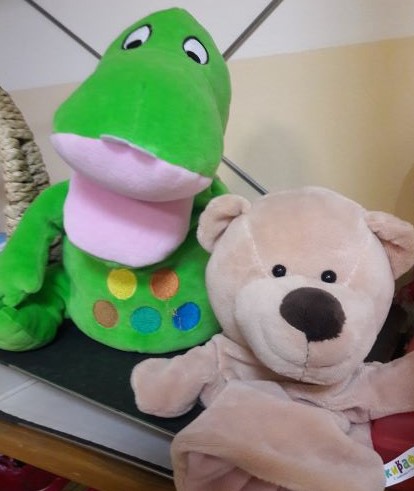
Enter Sasha
She is five years old and is a big sister to a baby brother. She is in the second year of our EFL course. The group in which she is studying is not big at all, only four kids, two boys and two girls. We can meet only once a week, on Saturday morning, for two real hours.
It happens in the second half of the lesson. The kids are completing the literacy development activities, tracing letter M and gluing in a few pictures with mum, a mouse, a monkey. They are having fun because at the same time we are playing our new favourite game: what colour is it? Which is about making up new names for all the colours. No more ‘green marker’ then, no more ‘purple marker’. They have been rebranded as ‘a cucumber marker’ and ‘an aubergine marker’. All of a sudden brown is the new black because we all call it ‘a chocolate marker’ and everyone wants to use it.
Just then, both Sasha and Andrey reach out for the same marker and Sasha waves her hand so unfortunately that she hits Andrey, not very hard to make him cry but hard enough to cause discomfort. Andrey gets upset.
The teacher says ‘Oh, Andrey, are you ok? Sasha didn’t mean it. She will say sorry. Sasha, please say sorry.’
But Sasha shakes her head.
Teacher continues ‘Sasha, you are fantastic and you did not mean it. But Andrey is sad. If you say ‘I am sorry’, he will be happy’ (all that navigating carefully between the buoys of acceptable English and English graded to the pre-A level, with all the gestures, soft voice and empathy). Andrey is calmer but Sasha shakes her head. ‘Sasha, please say sorry’
And this is when she raises her head, looks at the teacher with defiance and says, in her L1 ‘You can’t tell me what to do. You are not my boss’
The teacher sighs, struggling to keep a straight face because it is hilarious. Even more so because the word she uses is very formal, strong and way above the 5-year-old range. A corporate culture vernacular, she has picked up somewhere. The teacher gives up and once again smiles at Andrey. ‘It’s OK, Andrey. Don’t worry. It’s going to be OK’
The lesson goes on…
The kids go back to tracing the letters. Just then, Sasha suddenly stands up and starts walking. The teacher looks up and says ‘Sasha, please sit down’ but this is when the little girl looks at the teacher again, right in the eye. The last traces of defiance are gone and now she is something new about her, something in her eyes, as if she is saying ‘Please, let me do it’. The teacher nods her head.
Sasha goes around the table, behind the other kids’ backs, until she reaches Andrey. He looks at her but she bends, with her hands cupped around her mouth and his ear and says in L1 and in that child whisper that absolutely everyone in the room can hear clearly ‘Andrey, please don’t tell anyone, it is a secret. I am really sorry. I didn’t mean it’. The she just goes back to her seat and finishes her task, as if nothing has happened. Nothing at all.
The things that I have learnt from this story
- Kids are different and even the bravest and the most outspoken ones will not feel very comfortable with all the limelight and attention on them, positive or negative, even if the audience comprises of only four other people that they know really well.
- The teacher has to react to any unwanted behaviour to signal that this is not what we are going to tolerate, however, it is also up to the teacher to decide how long this ‘reaction’ should last. When does it stop being effective and turns into ‘torture’ and ‘punishment’
- Is it always a good idea to encourage or to make the kids say that they are sorry there and then even if they don’t mean it and don’t want to do it? Debatable. It might be a good idea to leave some room for the learner and human autonomy and let them sort it out themselves, under a teacher’s supervision, of course.
- What Sasha said to the teacher could have been potentially interpreted as a lack of respect but it was something that was clearly overheard at home and applied in a different context, in a similar situation. It never happened before and it never happened again afterwards and, to be honest, the only difficult thing about it was that I had to keep a straight face, although inside I was rolling with laughter.
- Sasha did understand very well that she was the responsible one, she did not feel comfortable with it and wanted to signal her discomfort to the world. And, in a way, she did and effectively so. Perhaps a sad face or tears would be a more typical way of reacting in such a situation, a more predictable one but children are different and they react differently.
- We did have our happy ending but if I were to give any advice to this teacher (well, myself from a few years ago), I would suggest telling Sasha a secret, instead of drawing even more attention to something that she did do.
Happy teaching!
1 thought on “Child development stories #2”